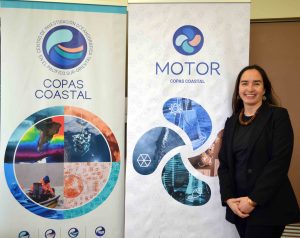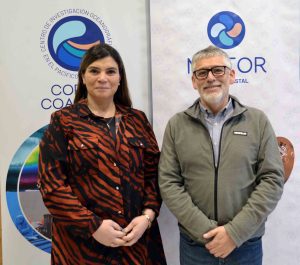This plan will allow the generation of early warnings for management in ports or docks, as well as, in the context of climate change, preparation for future impact scenarios related to tidal waves, temperature changes and red tides, among other phenomena.
COPAS, with nearly two decades of excellent science development and research, has established itself as one of the relevant scientific entities in the field of oceanography. In her desire to continue contributing to science, she has incorporated the MOTOR (MODELATION, TECHNOLOGY, OUTREACH, TRANSFER) initiative into her internal organization.
MOTOR seeks to contribute to bridging the nation’s existing gap in ocean engineering and operational oceanography. Having knowledge in these areas that helps create and manage an ocean monitoring system to feed operational models becomes key to optimal resource management and sustainable coexistence with the ocean. MOTOR will allow at the same time to improve the transfer of said knowledge to society, decision makers and the productive sector for its effective application.
The engine unit consists of four work axes: “Modeling”, “Technological Development”, “Education and Publishing” and “Public Service and Natural Resources”, which depend on the management of the center and the executive management of transport, while the presence of their coordinator and work team.
Sandra Espinosa, Commercial Engineer and Masters in Technology Innovation and Entrepreneurship, is the Executive Direction for Transportation in charge of MOTOR, which with her team will work on managing transportation projects in emerging regions at the regional and national levels.
There is currently a noticeable gap between the results of scientific research and what society as a whole receives. This situation is replicated in many national centers and COPAS wants to take charge through MOTOR, assuming the challenge of shortening this distance with society, organizations from the public and the business world, creating a bridge and linking the needs of these entities with knowledge”, explains Transport Executive Director Sandra Espinosa.

The four axes of action
Modeling is under the coordination of Drs. Sergio Neira and Gonzalo Saldias. Researchers will participate in interdisciplinary projects to implement and improve coastal, atmospheric, ecosystem and individual circulation models. “One of our goals is to achieve a model that integrates all of these levels and allows us to assess the entire ecosystem,” explains one of the curators, Dr. Sergio Nera. Among the problems that this axis seeks to address is a better understanding of how living components (ie, populations, marine communities, food webs) and non-living components of an ecosystem (oceanology and habitat conditions) interact.

The Education and Publishing Hub, coordinated by Dr. Paul Gomez, will continue with the line that has been in place since 2013 that has positioned COPAS as the national standard on ocean culture issues.
Activities will focus on the school community, coastal communities and also marine science conductors, including journalists through whom the community can be reached.
The final axis of the drive unit refers to the public service and natural resources, coordinated by Ricardo Nuramboena, with whom efforts will be directed to the transfer of knowledge for decision-making in the field of conservation and sustainable use of marine ecosystems in Chile.
Currently, in the context of climate change, it is necessary to strengthen the monitoring of changes occurring in the seas, which vary along our coast. According to Norambuena, “…we have limited ability to feed into models that can create future climate scenarios for impacts that we cannot ignore. For example, changes in sea water temperature will affect the distribution of marine assemblages that underlie the livelihood of the many fishing communities along Coast. An increase in the frequency and intensity of waves is also expected, which will undoubtedly affect the infrastructure of fishing bays and reduce working days. In these situations it becomes necessary to prepare and adapt in time. “
This hub also consists of LBTx-UdeC, the first marine toxicology detection services laboratory in the Biobío region, run by Dr. Alison Astoya, examining emerging unregulated toxins, which have emerged due to climate change. “We hope to be able to offer our services to the public sector, to entities that today do not have the analytical capacity and who derive their analyzes to Santiago or Puerto Montt; but also to the private sector such as canneries and other companies,” says the researcher. In this way, the MOTOR unit is presented as an innovation in the field of oceanography, in which an independent entity with clear axes is created, which is aligned with an operations center and staff dedicated to linking the most urgent needs of the Chilean coasts and their inhabitants.

“Creator. Devoted pop culture specialist. Certified web fanatic. Unapologetic coffee lover.”
